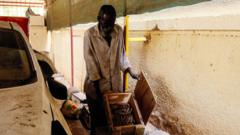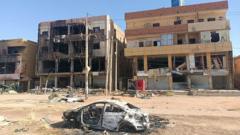As Syria begins to heal from a prolonged civil conflict, many citizens are focused on preserving the remnants of their uprising. From banners displayed in streets to artifacts salvaged from brutal pasts, these remnants serve both as memorials and warnings for future generations.
Syria's Struggle to Remember: Preserving a Legacy of Resistance

Syria's Struggle to Remember: Preserving a Legacy of Resistance
Efforts to document Syria's civil war serve as a reminder of oppression and a plea for justice.
In a poignant move to commemorate the struggles endured during the Syrian civil war, people are gathering items— banners, posters, and even tools of oppression. Their aim is to create a lasting record of the resistance against the regime of Bashar al-Assad, a narrative etched in history that they believe should never be forgotten. These efforts are driven by a deep-seated wish for accountability and justice.
In the northwestern town of Kafranbel, posters and graffiti symbolizing resistance remind citizens of the difficult battles fought. Others, such as Mutassim Abdulsatir, a survivor from the infamous Sednaya prison, express their desire to collect physical remnants of their trauma. Abdulsatir sees these artifacts as vital reminders of the past, salvaging items like woven nooses found within the prison to exhibit in a way that tells of their grim history.
"This must become a remembrance for days to come," Abdulsatir insists, emphasizing the importance of recognition and reflection to prevent such horrors from occurring again, not only in Syria but elsewhere in the world. As the past echoes in their present, the people of Syria remain determined to encapsulate their bitter history for both remembrance and as a warning against totalitarianism.
In the northwestern town of Kafranbel, posters and graffiti symbolizing resistance remind citizens of the difficult battles fought. Others, such as Mutassim Abdulsatir, a survivor from the infamous Sednaya prison, express their desire to collect physical remnants of their trauma. Abdulsatir sees these artifacts as vital reminders of the past, salvaging items like woven nooses found within the prison to exhibit in a way that tells of their grim history.
"This must become a remembrance for days to come," Abdulsatir insists, emphasizing the importance of recognition and reflection to prevent such horrors from occurring again, not only in Syria but elsewhere in the world. As the past echoes in their present, the people of Syria remain determined to encapsulate their bitter history for both remembrance and as a warning against totalitarianism.



















